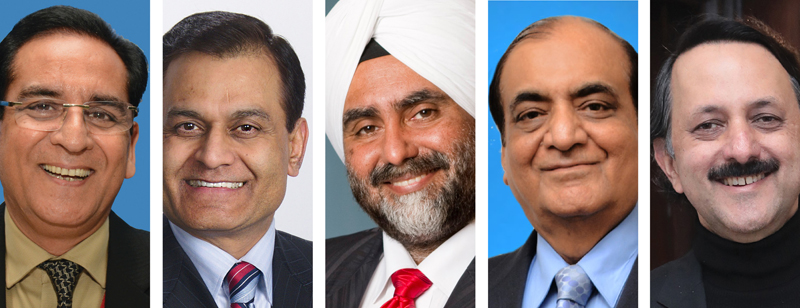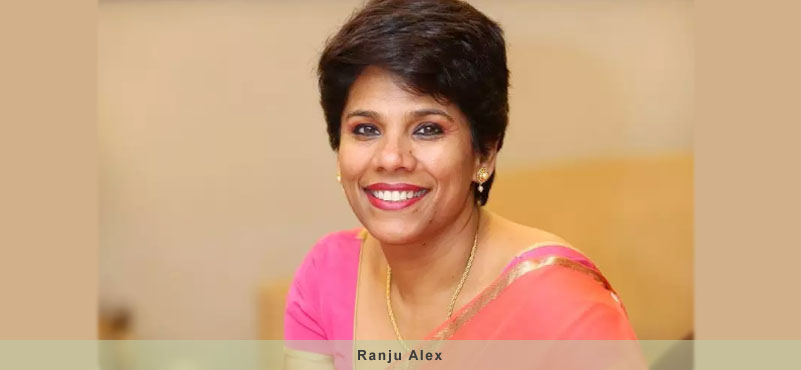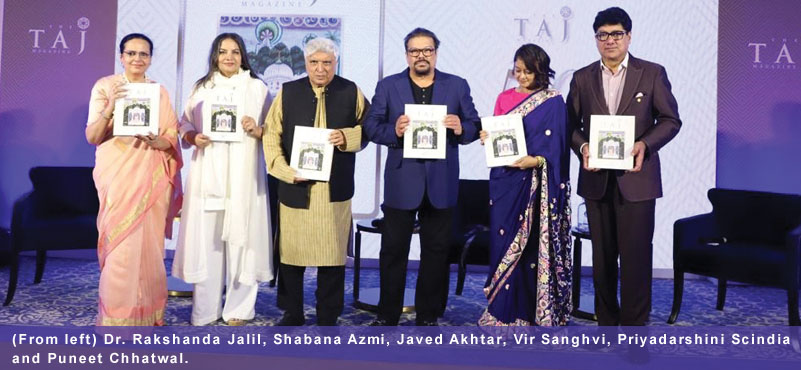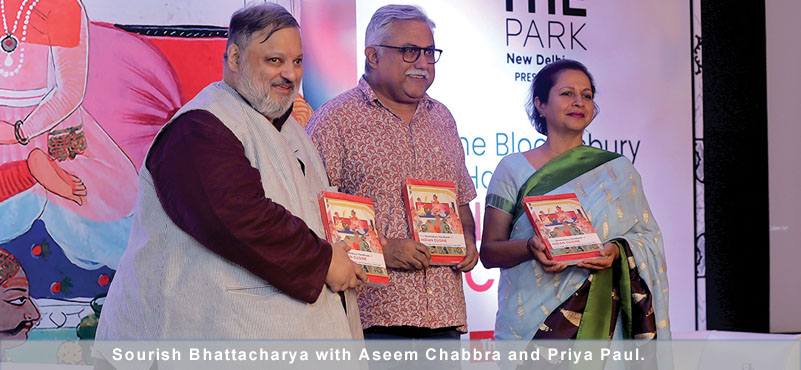Celebrated at The Leela in Gurgaon, with keynote address by Suhel Seth on trends he envisaged in the hospitality industry, the second IHM Alumni meet was held recently in the capital. Typical of Suhel’s style, he did not spare from pulling punches, at the same time addressing some of the most relevant issues – such as how service needs to be raised to global standards, his understanding of luxury, and the need for understated and unobtrusive, but most energetic and efficient service. He talked about cuisines, architecture and building brands, among others.
A number of panel discussions on diverse issues, both, purposeful and trending were undertaken. A session on entrepreneurship explored how hotel industry professionals, in the recent years, had dovetailed in to newer segments of businesses. In totality, it was an opportunity for professionals to come under one roof for reflecting on present-day challenges and opportunities in the Indian hospitality industry. Interestingly, anchoring and ushering of the event was done by the current batch of Pusa students, giving them a unique opportunity to rub shoulders with the finest in the industry.
Some of the most well-placed alumni were in attendance. One of them, Rajiv Menon from Marriott, who could not make it to the event, sent a video message. All the attendees were nostalgic about their days at the IHM.
Among the major achievements of the alumni event has been to have the institute accept their recommendation of erecting a wall for commemorating achieves from the past.
The present Principal spoke extensively. The previous head of the institution, the late Alok Shivpuri, who passed away earlier this year, was remembered and two minutes of silence was observed in his memory. His wife received a memento from the alumni. All of them were vocal in their praise for Mr. Shivpuri for bringing IHM to where it stands today.
A number of awards were bestowed on the most accomplished of the alumni. These included Sanjeev Kapoor, the celebrated chef, beside KB Kachru, Anil Bhandari, Raj Rana, Mandeep Lamba, Kapil Chopra, among others.
In a related development, we have roped in some of these veterans, once a part of the IHM as budding professionals, and speak with them on various facets of their journey in the institute, and the role it played in shaping them as consummate hospitality professionals.
Here are excerpts of our interaction with KB Kachru, Chairman Emeritus of South Asia and Principal Advisor of South Asia at Carlson Rezidor Hotel Group; Mandeep Lamba, Managing Director at JLL India; Raj Rana, Chief Executive Officer-South Asia – Carlson Rezidor Hotel Group; Anil Bhandari, AB Smart Concepts; and Rohit Khattar, Chairman, Old World Hospitality.

How do you recall your years at IHM, in terms of its ability to impart the quality education that made you arrive at where you have, at the top levels in Indian (and international hospitality) industry?
KB Kachru: In the sixties & seventies, IHMs were the only Institutions offering education in Hospitality at the undergraduate level. The Oberoi’s had a Management training programme, which was excellent, but had limited intake.
The IHM curriculum was comprehensive and taught us practical and theoretical aspects of each department of the hotel. It also gave an insight into management, finance and accounting. However, we still needed more on the job experience to take up Management positions.
I think it adequately prepared me to manage hotels at an early age. I was only 23 when I got to manage my first mid-size hotel. This couldn’t have been possible otherwise.
Mandeep Lamba: Clearly, my years at IHM PUSA are amongst the most cherished periods of my life. What we learnt there has empowered my career and allowed me to differentiate myself from others, and has played a significant role in my career path.
Anil Bhandari: I joined IHM Pusa in the year 1966. We operated from an improvised barrack-style building, cooked on sigrees (Indian style stoves). Then in 1967 we shifted to a new building where the college is functioning since then.
The college was equipped with the latest equipment which was available then. We had the best curriculum relevant at that time.
During our time the human element was dominant, we were taught by dedicated teachers. We had to do everything manually, that is front office management, cooking, cleaning, washing and book-keeping. Today most of this has been replaced with computers, software, microwaves, vacuum cleaners, etc.
The quality education we received encouraged the human touch and interaction which is not the case today. We did most of our practical assignments hands-on as we did not have the kind of equipment available today. We learnt intricacies of Finance and prepared Balance Sheets without the help of software.We imbibed basics and nuances of operating and managing Business. There were fewer cookery books. We wrote recipes manually because of which we remember them even today. Our lecturers had excellent knowledge about their subjects. They were dedicated. Today many lecturers do not compare to them. Standards of discipline were much better than what they are today.
Raj Rana: IHM, Pusa Road was well known as a cutting-edge institute in India in my days and it has successfully maintained that reputation in the present times as well. Although the campus was humble, the faculty was committed and instrumental in shaping a lot of industry leaders of today. I fondly remember the days full of mischief and learning, which inculcated character traits like discipline, excellence in quality and service and leadership in me and have continued to inspire me as a hotelier.
Over these years, it is logical to presume that much has changed in hospitality education around the world. Where do you see these changes and how these are impacting the way we run our hotels? Mention a few key factors.
KB Kachru: Although technology has changed the way we operate our hotels with advanced Property Management systems, but the human element will never become obsolete in the hospitality industry. Training staff to deliver a memorable experience to guests will always be of utmost importance. The staff will however also need to be trained adequately on the new technology from time to time.
Mandeep Lamba: A lot has changed over the years and technology has gradually replaced several manual processes and procedures in the digital era. These changes have made a significant difference in the guest experience at hotels and will continue to impact guest experiences rapidly with exponential growth in technology.
We have over the years seen the hotel room key completely disappear and be replaced by electronic key cards. This is now going to change to key less locks with smart phones using a QR code digital key to open room locks without even requiring to go to the front desk for a traditional check in. Similarly, room service delivering your morning tea was replaced with tea/coffee makers in the rooms which will further be replaced within the next decade by robots.
Anil Bhandari: The customer of tomorrow is turning to high-tech gadgetry. Hospitality education, as also hotels, needs to embrace and keep up with new and developing technology.
Healthy, nutritious, hygienic and organic food is increasingly in demand. We need to work out new ways to cook healthy food. Gen-Next customer will demand new and novel dishes at hi-speed. The need to create new dishes to meet novel demands is a happening process.
We need to effectively control cost such as manpower, HLP (heat, light, power) to manage a business profitably. As there will be many more hotels and restaurants opening up, the institutes will have to inculcate the spirit of competition in their students.
The next generation tourist visiting India would prefer to see things different from his country. He would prefer to see indigenous designs and ethnic architecture, experience regional cuisines and local entertainment, etc. Catering institutions need to add this aspect to their curriculum.
Raj Rana: I believe that hospitality requires talent with special emotional skills like empathy, perseverance, passion and pride besides basic competencies like communications skills and technical knowledge of the hotel industry. It is important for educational institutes to instill these softer skills in students through group exercises and more collaborative teaching methodologies. In times where technology and automation are replacing human interaction, these soft skills are what will make the biggest differentiators for brands in the market.
Where has Indian hospitality arrived, in terms of schooling and what are the major challenges you see in this regard?
KB Kachru: The Indian Hospitality industry is still evolving and will be on expansion mode. The need for skilled personnel is more than ever before. We are hopeful that the Skill India programme will help to meet this demand.
Mandeep Lamba: Indian hospitality schools are attempting to tie up with internationally reputed hotel schools in order to keep their curriculum contemporary, and in accordance with updated hospitality practices. IHM Pusa has also tied up with Lausanne hotel school to ensure that the curriculum being taught is in accordance with industry expectations.
Anil Bhandari: Quality of education needs a lot of improvement in terms of curriculum, faculty and technology. Mushrooming growth of so-called catering colleges run as money-making ventures instead of management institutes is the reason for lowering of standards. IHMs and a few of the private training institutes are maintaining standards.
Today, education is not in tune with industry requirements. So, hotels are compelled to re-train their staff recruits to enable them to hold managerial positions. After our induction in hotels we were appointed at managerial positions. I worked as an executive in front office, restaurants, housekeeping, etc.
Raj Rana: While there has been a general improvement in quality of talent hired from various hospitality management institutes over the past years, I feel they can add more practical learning by offering regular industry visits, internships and live demonstrations. Institutes should also invite more visiting faculty from the industry to share real life experiences.
In hospitality, it is crucial for a person to have the right attitude and ‘hospitality quotient’ which is in large parts a natural personality trait. However, hotel management institutes can also help hone this aspect of people’s personality by providing more practical, on-the-job learning opportunities.
Where do you see IHM today within this picture? In sync or not, and how much, and why?
KB Kachru: IHMs will definitely be the main providers of the Management cadre to the industry. IHMs have also produced world class chefs in the past and will continue to do so in the future too. We are really glad that the curriculum has also been updated from time to time to meet the needs of the industry.
Mandeep Lamba: The college has attempted to remain relevant. However, the entire amalgamation of the Lausanne curriculum with the current academic curriculum has not been completed leaving some academic material reasonably ancient.
Anil Bhandari: Government is not updating technology and syllabi due to shortage of funds. This is the reason that IHMs are continuing to use old equipment. Lecturers are not getting opportunities to update themselves with latest trends and technology and are paid less than operational managers in hotels. Good people are not opting for education as a career.
We had classes comprising 30 to 35 students. We all had individual gas ranges to use whereas today four students share one gas range. Today the number has doubled but the infrastructure, of cooking ranges and other equipment, remains the same. This leads to lack of personal attention between teachers and students.
Raj Rana: I am pleased to see students graduating from IHM. The stellar quality of education at the institute speaks for itself as Pusa road graduates are sought after not only in hospitality but other industries as well and find career opportunities in multiple spheres.
The industry can do more to find fulfilling jobs for hotel graduates and address the problem of attrition, particularly amongst women. We need to more women staying on in the industry and pursuing leadership roles.
As a leading alumnus, how do you think you can help IHM go up some notches and become a recognized international brand? Is some level of private participation the answer?
KB Kachru: As alumnus, we try to do what we can to support the institution in terms of providing training positions to the students in our hotels. Carlson, in the past, instituted a scholarship in my name for the outstanding girl student of the year. As Chairman of the Alumni Association, along with president and other Committee members, we devote reasonable time to the activities of PIHMA. Events such as these do help to position the institution better. The association promotes innovation based activities. This year we introduced” The Student of the year” competition that will give exposure to the students and motivate them to perform. The recognition will come automatically, as our alumni are now holding top management positions domestically and internationally.
Mandeep Lamba: As an alumnus of the institute and the president of the alumni association, it is my endeavour to assist in building the brand equity of the college through constant industry interaction with the college including regular mentoring visits by senior hospitality professionals with the students and teachers of the college. Yes, some level of private participation would be useful for the college and its students.
Anil Bhandari: Government is not updating technology and curricula due to shortage of funds. This is the reason that IHMs are continuing to use old equipment.
Lecturers are not getting opportunities to update themselves with latest trends and technology and are paid less than operational managers in hotels. Good people are not opting for education as a career.
We had classes comprising 30 to 35 students. We all had individual gas ranges to use whereas today four students share one gas range. Today the number has doubled but the infrastructure, of cooking ranges and other equipment, remains the same. This leads to lack of personal attention between teachers and students.
Raj Rana: I believe hotel institutes should look at a mentorship collaboration progarmme where every alumnus adopts a few talented students as mentees. Visiting faculty can serve as inspiring role models and provide practical advice, therefore these should be integrated to a higher degree in the curriculum.
Is some level of private participation the answer?
KB Kachru: There is already private participation. Some of the Leading hotel chains have already established, or are supporting few hotel schools. Most of the recognized hotels are supporting in the form of training positions for the students in the private sector hotels. Senior hotel managers also give inputs in the form of visiting lecturers to IHM. The institute is adequately funded by the Ministry of Tourism. Whenever the Principal and faculty reach out to the industry and particularly to alumni for assistance, all are forthcoming to help.
Rohit Khattar
On days in IHM Pusa
I only did my first year at IHM Pusa and then transferred over to finish the rest of my Hotel and Restaurant Management from the US. Therefore, it is probably not fair for me to comment on all these questions.
Impact of IHM Pusa
All I can say is that the foundation at IHM Pusa has stood me and everybody in great stead. I recount fond memories of my one year there. The fact that some of the leading hoteliers and restaurateurs in the country are alumni of IHM Pusa speaks volumes about its education and its impact. Some of the larger chains in the world today could hire literally anybody from any country with varying backgrounds in education and the fact that IHM graduates are the ones leading these companies is testimony enough.




































